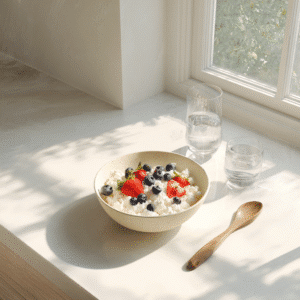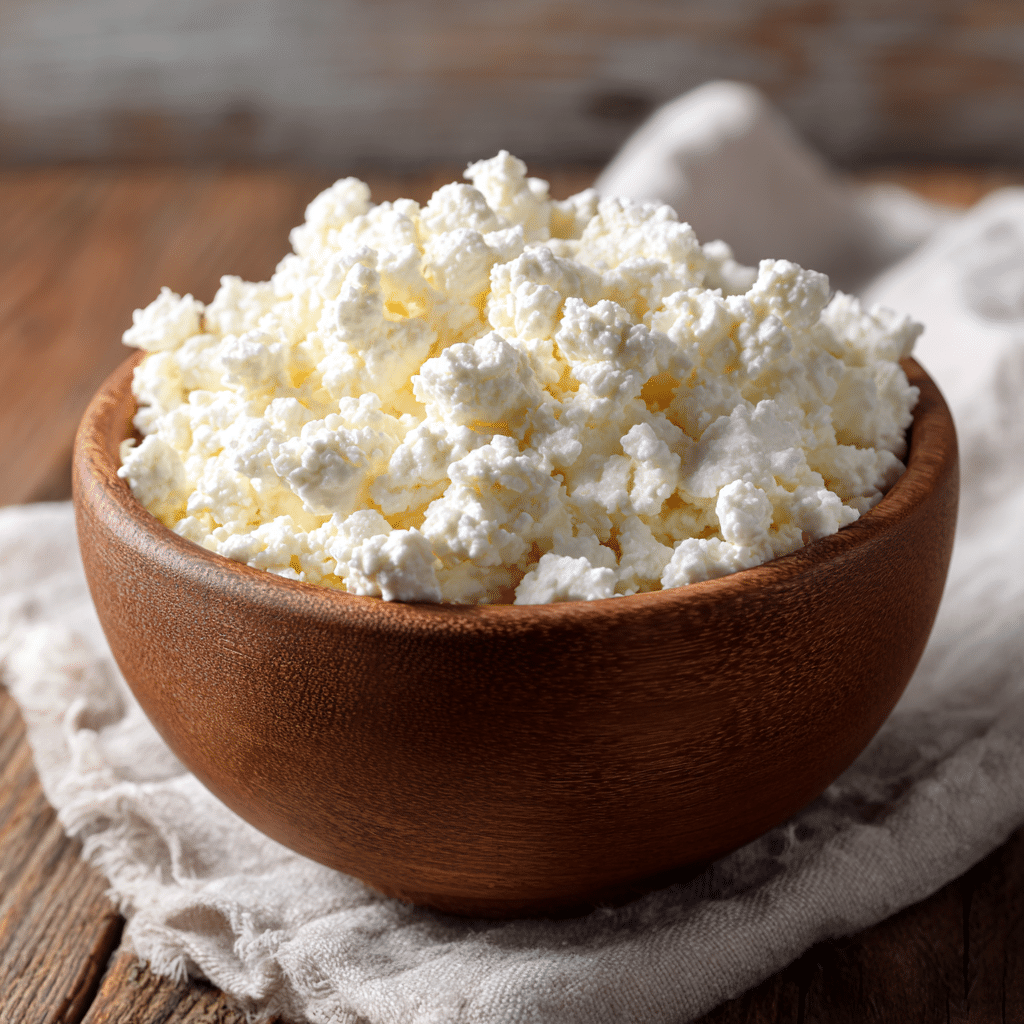
Is cottage cheese healthy? If you’ve asked this question lately, you’re not alone. Cottage cheese is popping up in health blogs, diet plans and social-media food trends. In this guide, we’ll dive into what cottage cheese really offers, how it stacks up for weight management, the potential risks, and whether it’s truly healthy for everyday eating. You’ll learn how to make the most of this food without falling into common traps.
Understanding Cottage Cheese and Its Nutritional Profile
What Is Cottage Cheese? A Basic Overview of Cottage Cheese Health
Cottage cheese is a fresh, soft cheese made from curds of cow’s milk. Many people ask, Is cottage cheese healthy? because it is different from aged cheeses. The curds form when milk is curdled by adding an acidic substance or rennet. After draining the whey, the remaining curds are washed and sometimes mixed with cream to create cottage cheese. This process results in a product rich in protein and low in fat, making it a popular choice for those focusing on health and nutrition.
Key Nutrients Found in Cottage Cheese and Why It’s Healthy
When considering is cottage cheese healthy, its nutritional profile stands out. Cottage cheese provides high-quality protein, essential for muscle repair and growth. It also contains calcium, which supports bone strength and nerve function. Additionally, B vitamins like riboflavin and vitamin B12 in cottage cheese help with energy metabolism. While cottage cheese is healthy overall, be aware that some store-bought varieties contain higher sodium levels, so selecting low-sodium options can make your diet healthier.
Health Benefits of Cottage Cheese
How Cottage Cheese Supports Muscle and Bone Health
Cottage cheese is a nutrient-dense food that supports muscle health due to its high protein content. Many fitness enthusiasts ask, Is cottage cheese healthy for building muscle? The answer is yes—its casein protein digests slowly, providing a steady supply of amino acids that help repair muscle tissue. Additionally, cottage cheese is rich in calcium, which strengthens bones and helps prevent osteoporosis. Including cottage cheese in your diet can promote stronger muscles and bones, contributing to overall health.
Role of Cottage Cheese in Digestive Health
Beyond muscles and bones, cottage cheese can also benefit digestion. It contains probiotics in some varieties, which support gut health by maintaining a balance of good bacteria. Proper digestion is essential for nutrient absorption and overall well-being. However, not all cottage cheese contains live cultures, so checking labels is important. This digestive support is another reason many people consider whether is cottage cheese healthy to include regularly in their diets.
Cottage Cheese and Weight Management
Can Cottage Cheese Help You Lose Weight?
Many wonder, Is cottage cheese healthy for weight loss? Cottage cheese is low in calories but rich in protein, which helps increase feelings of fullness and reduce hunger. This satiety effect can aid in controlling calorie intake throughout the day. Its slow-digesting casein protein also supports muscle preservation during weight loss, making it a smart choice for those trying to shed pounds without losing muscle mass.
How to Incorporate Cottage Cheese in a Balanced Diet
To benefit from cottage cheese while managing weight, include it as part of balanced meals and snacks. Pair cottage cheese with fruits, vegetables, or whole grains for added fiber and nutrients. Opt for low-fat or reduced-sodium varieties to keep your diet healthier. Eating cottage cheese regularly in moderate portions fits well into various eating plans focused on healthy weight management.

Also, try incorporating cottage cheese into different meals—smoothies, protein bowls, salads, and pasta sauces—to keep it interesting and satisfying. For example, this creamy cottage cheese pasta sauce makes a high-protein dinner that tastes indulgent without the heaviness. Adding variety helps you enjoy the health benefits of cottage cheese without getting bored.
Potential Risks and Downsides of Cottage Cheese
Common Concerns About Sodium and Fat Content
When considering is cottage cheese healthy, it’s important to understand some potential risks. Many store-bought cottage cheese varieties contain high sodium, which may affect blood pressure if consumed in excess. Additionally, full-fat cottage cheese has higher saturated fat, which could impact heart health. To keep your diet balanced, choose low-sodium and reduced-fat cottage cheese options. Paying attention to these details helps you decide if cottage cheese is healthy for your individual needs.
Allergies and Intolerances Related to Cottage Cheese
People often ask, Is cottage cheese healthy for those with allergies or intolerances? This dairy product contains lactose and milk proteins that can cause problems for people with lactose intolerance or dairy allergies. Symptoms such as bloating, cramps, or allergic reactions may occur. If you experience these issues, lactose-free cottage cheese or dairy substitutes could be better choices. Always consult a healthcare professional before adding cottage cheese regularly to your diet, especially if you have sensitivities.
Comparing Cottage Cheese with Other Dairy Products
Cottage Cheese vs. Yogurt: Which Is Healthier?
When deciding is cottage cheese healthy compared to yogurt, both have unique benefits. Cottage cheese offers higher protein content, especially casein, which digests slowly and supports muscle maintenance. Yogurt, especially those with live cultures, provides probiotics that enhance gut health. If your goal is muscle building or weight management, cottage cheese might be the better choice. For digestive health and immune support, yogurt could be preferable. Ultimately, including both in your diet can provide a balanced mix of nutrients.
Nutritional Comparison With Other Popular Cheeses
Cottage cheese stands out among cheeses for its lower fat and calorie content. Hard cheeses like cheddar or gouda often have more saturated fat and calories, which some people limit for heart health reasons. Compared to processed cheeses, cottage cheese is a fresher, less processed option with fewer additives. If you’re asking Is cottage cheese healthy?, its nutrient profile is generally more favorable than many traditional cheeses, making it a smart choice for health-conscious eaters.
How Often Can You Eat Cottage Cheese?
Is Cottage Cheese Safe for Daily Consumption?
Many people ask, Is cottage cheese healthy enough to eat every day? The answer depends on individual dietary needs and health conditions. For most healthy adults, eating cottage cheese daily can be safe and beneficial due to its rich protein and calcium content. However, those monitoring their sodium intake should choose low-sodium versions and limit portions. Incorporating cottage cheese daily supports muscle maintenance, bone health, and overall nutrition without negative effects for most people.
Recommended Serving Sizes and Frequency
To enjoy cottage cheese healthily, stick to moderate serving sizes, typically half a cup to one cup per day. This amount provides sufficient protein and nutrients without excess calories or sodium. Pair it with fresh fruits, vegetables, or whole grains for balanced meals. If you’re new to cottage cheese, start with smaller portions to see how your body reacts. Eating cottage cheese regularly but in reasonable amounts helps maintain a balanced and healthy diet.

Unhealthy Cheeses to Avoid and Why Cottage Cheese Is Healthier
What Is the Most Unhealthy Cheese in the World?
When asking Is cottage cheese healthy?, it helps to compare it with cheeses that are less nutritious. Some of the most unhealthy cheeses include processed options like spray cheese, cheese spreads, and certain types of blue cheese that are very high in saturated fats and sodium. These products often contain additives, preservatives, and artificial ingredients that provide little nutritional value. In contrast, cottage cheese is a fresher option with a shorter ingredient list and far fewer calories and additives.
What Makes Cottage Cheese the Healthier Option
So, is cottage cheese healthy enough to replace your usual go-to cheese? Absolutely. It’s lower in calories, fat, and sodium than cheddar, brie, gouda, or cream cheese. Plus, its high protein content helps keep you fuller longer, making it a smart addition to meals focused on health and weight control.
If you’re following a clean eating plan or watching your fat intake, cottage cheese is healthy because it provides quality nutrients without the heaviness of traditional cheeses. It also fits easily into both savory and sweet dishes. Many dietitians agree that cottage cheese is healthy for regular use, especially when compared with heavily salted or processed cheese products.
Still asking yourself, Is cottage cheese healthy? The answer remains yes, particularly when compared to high-fat, low-protein cheeses that do little for your overall nutrition. For an easy and high-protein option, try our Cottage Cheese Protein Bowl, a great alternative to heavier cheese-based meals.
Final Thoughts—Is Cottage Cheese Healthy?
Summing Up the Health Benefits of Cottage Cheese
After reviewing the facts, many people arrive at the same conclusion: yes, cottage cheese is healthy. It offers a rare combination of high protein, low fat, and essential nutrients like calcium and B12. Whether you’re aiming for weight loss, building muscle, or just trying to eat clean, it fits into most dietary plans with ease. Compared to other cheeses, it has fewer additives, less saturated fat, and lower sodium—especially in the low-sodium versions. When you’re asking yourself, Is cottage cheese healthy for me?, it helps to look at how it supports your health goals and fits within your personal nutrition needs.
How to Make the Healthiest Cottage Cheese Choices
To get the most benefits, choose plain, low-sodium, or low-fat cottage cheese. Avoid flavored versions with added sugars or unnecessary thickeners. Read labels carefully, especially if you’re watching sodium or fat intake. Also, try incorporating cottage cheese into different meals—smoothies, protein bowls, salads, and pasta sauces—to keep it interesting and satisfying. If you’re still asking, Is cottage cheese healthy in all forms?, remember that the healthiest versions are always the simplest and least processed.
Try using cottage cheese in smoothies, salads, or pasta to keep meals satisfying. These cottage cheese egg bites are an easy, protein-packed option to start with.
FAQs
Is cottage cheese ok to eat every day?
Yes, for most people, eating cottage cheese daily is safe and beneficial. It’s high in protein and provides essential nutrients like calcium and vitamin B12. If you’re asking, Is cottage cheese healthy for daily use?, the answer is yes—especially when you choose low-fat or low-sodium options. Just be mindful of portion sizes and avoid varieties with added sugars or heavy flavoring.
Is cottage cheese ok for losing weight?
Absolutely. Cottage cheese is healthy for weight loss because it’s low in calories but rich in protein, which keeps you full longer. Its slow-digesting casein protein helps control appetite and preserve muscle during calorie restriction. Incorporating it into meals or snacks can support your weight goals without compromising on nutrition.
What is the most unhealthy cheese in the world?
Processed cheese spreads, canned cheeses, and extra-aged varieties often rank as the most unhealthy. These cheeses tend to contain high amounts of sodium, saturated fats, and additives. Compared to these, cottage cheese is healthy because it’s minimally processed and nutrient-dense, making it a better daily choice.
What’s better for you, cottage cheese or yogurt?
It depends on your health goals. If you want more protein with fewer carbs, cottage cheese is healthy and more suitable. Yogurt offers probiotics for gut health, but often contains more sugar—especially flavored types. Both can be part of a healthy diet, but cottage cheese is healthy for those focused on protein and satiety.
Conclusion
So, is cottage cheese healthy? The answer is a confident yes. From its high-quality protein and low calorie count to its versatility in meals, cottage cheese stands out as one of the best dairy choices available today. Whether you’re aiming to build muscle, support weight loss, or maintain a balanced diet, cottage cheese fits the plan.
Choosing low-sodium and low-fat versions only strengthens its health appeal. Compared to many other cheeses, it’s less processed, easier to digest, and full of nutritional value. Add it to your daily routine through smoothies, snacks, or main dishes—and you’ll likely notice the benefits.
If you’re still wondering, Is cottage cheese healthy enough for everyday use?, the evidence says yes. It’s simple, satisfying, and smart.
Follow more healthy food tips, recipes, and ideas on our Pinterest, Tumblr, X (Twitter), and Medium profiles.
Meet Emily Culino
Emily Culino is a passionate home cook, recipe developer, and nutrition-focused food writer based in the U.S. With a love for simple ingredients and smart eating, she creates easy-to-follow recipes that balance flavor and wellness. Through her blog, she helps readers make confident, healthy choices—without giving up the comfort foods they love.
Table of Contents

Healthy Cottage Cheese Bowl
Equipment
- serving bowl
- spoon
Ingredients
- 1 cup low-fat cottage cheese
- 0.5 cup mixed berries (blueberries, strawberries, raspberries)
- 1 tbsp chopped nuts (almonds or walnuts)
- 1 tsp honey (optional)
- 1 pinch of cinnamon (optional)
Instructions
- Add cottage cheese to a bowl.
- Top with mixed berries and nuts.
- Drizzle with honey and sprinkle cinnamon if desired.
- Serve immediately as a quick breakfast or snack.

